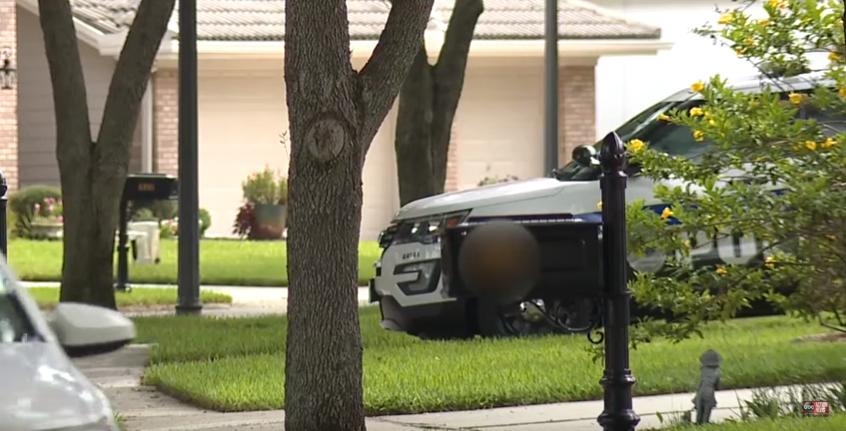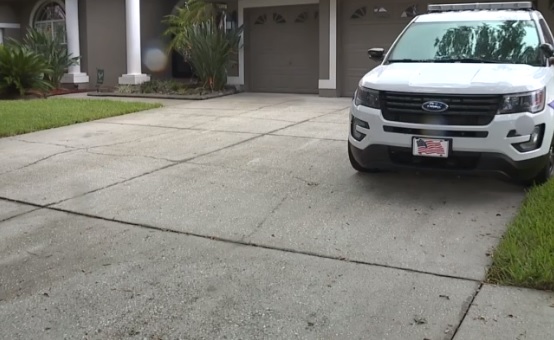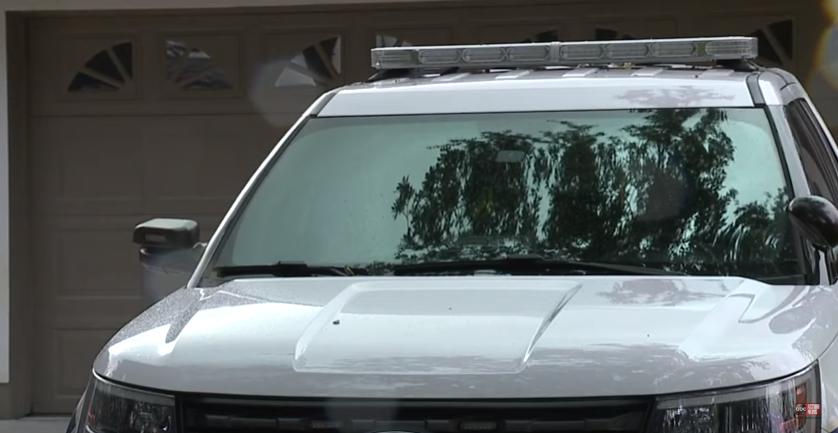

It finally happened. And it has been a long-time coming for Florida’s law enforcement officers who have take-home cars and park their response-ready police vehicles at their homes and told by HOAs that they can’t.
Florida Governor Ron DeSantis (R) on Friday signed S.B 476 into law, otherwise known as the self-explanatory Law Enforcement Vehicles law, protecting all Florida cops who have take-home cars from having to deal with the annoyance and threats from home owners associations (HOAs) ordering law enforcement officers remove their marked police vehicles from public view.
Why was such a statute necessary? Through the years, HOAs have been papering cops with “community violation” notices by claiming their bylaws prohibit “commercial vehicles.” Thus any vehicle with company markings parked in private driveways is deemed an eyesore, in violation of community covenants, and must be moved out of the subdivision or garaged from public view.
The latest example of this happened a few months ago in Clearwater, Florida, when two married cops, one of whom has a fully-marked take-home car parked in the driveway of their home, were threatened with legal action and fines…if they didn’t vanish the cop car.
ABC Action News aired the story and it circulated social media. Despite the wide publicity, the HOA stood firm, citing its bylaws and claiming it would involve its attorney.
No worries. The married cop duo happened to have a family friend who practices law in Tampa Bay; that lawyer friend took issue with it and spoke on behalf of the two Clearwater cops back in August 2019.
“Every place I’ve ever lived, if I had a police cruiser parked next to me, I felt safer,” said attorney Dan Parri.
My department dealt with this kind of ordeal in 2005—the letter/legal interpretation you just saw in the video was spawned by a Miami Beach police officer and his battle with his HOA, and my agency’s ordeal with one of our cops contending against an HOA whose rule mandated he hocus-pocus the marked police cruiser or suffer legal action. One of our newer cops at the time owned his own home in a city roughly 25 miles north of the jurisdiction. Our police agency permitted take-home cars as long as it remained within a 30-mile radius from police HQ. He was good-to-go.
One day, he checked his mailbox and found an envelope from his HOA. In the envelope was a “community violation” letter citing him for illegally parking a “commercial vehicle” in his driveway. Surely, he thought, there must be some mistake. He checked the name/address; it matched his name/residence. He called the HOA and inquired about the basis of the violation. He was told his “police car” was “in violation of the bylaws” and that he’d have to keep it out of the community or garage it so no one can see it.

Appalled, he contested their demand. As any astute cop should, he consulted the state law book at the time. Under traffic codes, specifically “commercial motor vehicle,” was everything having to do with vehicles used for business—plumbers’ trucks, landscaper pick-ups/trailers, electricians’ vans, cable guy vans, tractor-trailer rigs, etc. Nothing in the law’s language expressly stated anything pertaining to public safety vehicles. Generally, commercial vehicle laws contain language relevant to automobiles designated for business purposes. Public safety vehicles fall under what is known as “government services,” not “mercantile” such as pest control services—well, depends on the kind of pest, but that’s another matter.
To comprehend the pertinent meat and potatoes here, Florida State Statute 403.413 specifically defines commercial purpose/vehicle as follows: (b) “Commercial purpose” means for the purpose of economic gain. (c) “Commercial vehicle” means a vehicle that is owned or used by a business, corporation, association, partnership, or sole proprietorship or any other entity conducting business for a commercial purpose.” Nothing in that language applies to public safety or their government-owned mode of transportation.
Nevertheless, at impasse, the young cop with whom I worked midnight-shift spent daylight (sleep time) going back and forth with his HOA, contesting the validity of their “HOA violation notice,” citing the statute verbatim. The HOA stayed firm.
This young policeman informed our command staff who, in turn, requested an official opinion from then-Florida Attorney General Charlie Crist. Other Florida cops around the state were dealing with the exact same issue with their respective HOAs. I remember this debate going on for several months before the state weighed in and put to rest any further HOA harassment.
On State of Florida letterhead, Attorney General Crist obliged and sent our police chief a typed/signed letter declaring that “law enforcement vehicles” are not considered commercial vehicles per statute and, therefore, exempt.
As then-Attorney General Crist’s clarification letter concisely stated in 2005, “A marked police vehicle does not constitute a vehicle with reference to a commercial undertaking or enterprise.” Seems crystal clear.
But some HOAs apparently either do not read the state statutes, do not interpret the law the way the state AG did, or merely believe their bylaws somehow supersede state statute.
Either way, the damage was done. Despite winning his argument, this young cop just didn’t feel belongingness. He put his house up for sale and moved out of the subdivision. Much to the dismay of his neighbors, the “free security system” (what take-home police cars are deemed when parked/visibly seen in residential settings), alluded to earlier by attorney Dan Parri, was no more.
That was in 2005. Fast-forward: Identical situations in different HOAs across the land still transpire on case-by-case bases, and one of the latest is the Clearwater police officer’s August 2019 case we cited above. To be fair, since then the Clearwater cop’s HOA has relented (but with an obligatory twist indicative of stubborn behavior) and basically ceased bothering her about her police cruiser parked on her property.
As of Friday, all Florida law enforcement officers with take-home police-marked vehicles should never hear from any HOA again, at least not as it relates to their company car somehow being offensive or unsightly for…the will of bylaws and those who misinterpret them.
Should prior governors and their attorneys general have tackled this issue before it grew in number throughout the years? It’s rhetorical. The cops who directly experienced this sort of stuff surely think so. Through the years various media outlets reported on the latest subdivision whose respective HOA cited cops for illegally parking marked police cruisers in communities where folks bought homes to feel safe, secure, and comforted with the knowledge that a law enforcement officer lived next-door, across the street, or around the corner.
Evidently, a 2005 legal opinion from officials in the State Capitol building either lost its teeth or HOA boards changed guards and no one passed on the ruling.
Heck, many apartment complexes in Florida offer a discount to cops who rent a unit in their community, in exchange for parking their marked patrol car near the open/sometimes gated entryway (where they usually reserve apartments for cops and maintenance staff). As I understand it, the same thing exists in other states. It is considered a win-win. You’d think private subdivisions who govern the community with bylaws outlining dos and donts would prefer to have a police car advertising “protect and serve,” you know…to deter burglars, sexual deviants, and all manner of vermin. But no, some misinterpret the bylaws and make plenty of bones about it.
I met an attorney at my HOAs monthly meetings. I spoke to him briefly about some of the points up for discussion, and I asked him what other areas of law he practiced (since I aspire). He inhaled, said, “Just HOA, sir, and it sure keeps me busy.” All he does is represent either HOAs on the hook of a lawsuit or plaintiffs contesting HOA violations, like my police cohort mentioned earlier. (And by the way, my friend did have intentions to litigate, told the HOA his intention, and they basically told him to bring it on!)

But our police executives opting for the direct opinion from the governor’s office was ultimately the right way to go, especially since they had responsibility for the city-owned police car at the heart of the matter. That letter silenced one such situation.
Now, Florida’s lawmakers and governor etched it in stone with the Law Enforcement Vehicles law. This law not only accords cops to park their cop cars where they live, but it also extends to cops who visit others elsewhere, permitting the “right to park” as visitors upon property of friends/others, with zero prohibition from any HOA.
Seems necessary to reiterate the bevy of benefits from having law enforcement vehicles in residential communities. As former Florida Attorney General Charlie Crist wrote in 2005, “The provision of law enforcement services is an integral and constituent part of government. It is the performance of a governmental duty owed to the general public at large. This office has previously recognized that the assignment of a police vehicle to an officer to drive during off-duty hours to provide quicker response when called to an emergency would be of a direct benefit to the public. In addition, the presence of a police vehicle in a neighborhood may serve as a deterrent to crime.”
Florida State Senator Ed Hooper (whose district encompasses Clearwater PD) chimed in similarly, telling and ABC Action News reporter, “Having that visible deterrent in plain sight — if I were someone who was looking to [commit a crime] that, it would certainly tell me like maybe stay out of this neighborhood.”
Defending his police officers back in August 2019, Clearwater police Chief Dan Slaughter cited, “A [police] car is not a perk. It’s part of our emergency strategy.” Chief Slaughter underscored the decades-long behavior and strong-arming exhibited by some HOAs, saying, “Even in law-enforcement we have a rule that if you misuse laws or authority then you lose it. And I think that’s what really happened here.” Nothing like fair-minded logic, eh?
During a press conference in October 2019, more fair-minded logic was publicized by the Florida Senate and various police leaders jointly espousing a proposed Law Enforcement Vehicle law. Their sentiments are unmistakable. As State Senator Hopper clarified, this sort of tussle between HOAs and cops among their residential domains has “come up not overwhelmingly” but added one “is too widespread,” calling it ridiculous. “If it’s ten communities, we’ll fix that problem. If it’s 1000 communities, we’ll fix that problem,” he added.
Although I never encountered this kind of trouble from my HOA, my take-home police cruiser was, ironically, next-door to one parked by my neighbor who is a state trooper. Across the street is yet another police car, parked in the driveway of a cop employed by a different city. Two doors down is a married duo of county detention deputies, so their law enforcement uniforms (walking to/from their autos) are icons of security for neighbors to embrace. Around the corner is a county deputy and his marked sheriff’s vehicle.
Why do I say irony? When our subdivision was developed and new homes were put on the market, we all purchased/closed within a few weeks of each other, making it appear as if there was a real estate special for LEOs. There wasn’t. Pure coincidence. Respectfully, the non-sworn neighbors around us were endeared by a potpourri of police protecting the community, and the modes of transportation parked out front served as silent guardians at the gate.
Neighbors are quite content.
The National Police Association previously reported on and continued to follow this saga. We are grateful to Florida’s elected officials for exercising common sense and legislating supports for our law enforcement warriors.